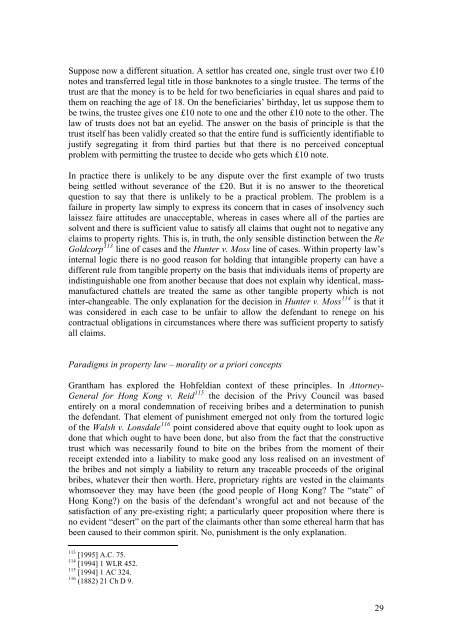The Unbearable Lightness of Property - alastairhudson.com
The Unbearable Lightness of Property - alastairhudson.com
The Unbearable Lightness of Property - alastairhudson.com
Create successful ePaper yourself
Turn your PDF publications into a flip-book with our unique Google optimized e-Paper software.
Suppose now a different situation. A settlor has created one, single trust over two £10<br />
notes and transferred legal title in those banknotes to a single trustee. <strong>The</strong> terms <strong>of</strong> the<br />
trust are that the money is to be held for two beneficiaries in equal shares and paid to<br />
them on reaching the age <strong>of</strong> 18. On the beneficiaries’ birthday, let us suppose them to<br />
be twins, the trustee gives one £10 note to one and the other £10 note to the other. <strong>The</strong><br />
law <strong>of</strong> trusts does not bat an eyelid. <strong>The</strong> answer on the basis <strong>of</strong> principle is that the<br />
trust itself has been validly created so that the entire fund is sufficiently identifiable to<br />
justify segregating it from third parties but that there is no perceived conceptual<br />
problem with permitting the trustee to decide who gets which £10 note.<br />
In practice there is unlikely to be any dispute over the first example <strong>of</strong> two trusts<br />
being settled without severance <strong>of</strong> the £20. But it is no answer to the theoretical<br />
question to say that there is unlikely to be a practical problem. <strong>The</strong> problem is a<br />
failure in property law simply to express its concern that in cases <strong>of</strong> insolvency such<br />
laissez faire attitudes are unacceptable, whereas in cases where all <strong>of</strong> the parties are<br />
solvent and there is sufficient value to satisfy all claims that ought not to negative any<br />
claims to property rights. This is, in truth, the only sensible distinction between the Re<br />
Goldcorp 113 line <strong>of</strong> cases and the Hunter v. Moss line <strong>of</strong> cases. Within property law’s<br />
internal logic there is no good reason for holding that intangible property can have a<br />
different rule from tangible property on the basis that individuals items <strong>of</strong> property are<br />
indistinguishable one from another because that does not explain why identical, massmanufactured<br />
chattels are treated the same as other tangible property which is not<br />
inter-changeable. <strong>The</strong> only explanation for the decision in Hunter v. Moss 114 is that it<br />
was considered in each case to be unfair to allow the defendant to renege on his<br />
contractual obligations in circumstances where there was sufficient property to satisfy<br />
all claims.<br />
Paradigms in property law – morality or a priori concepts<br />
Grantham has explored the Hohfeldian context <strong>of</strong> these principles. In Attorney-<br />
General for Hong Kong v. Reid 115 the decision <strong>of</strong> the Privy Council was based<br />
entirely on a moral condemnation <strong>of</strong> receiving bribes and a determination to punish<br />
the defendant. That element <strong>of</strong> punishment emerged not only from the tortured logic<br />
<strong>of</strong> the Walsh v. Lonsdale 116 point considered above that equity ought to look upon as<br />
done that which ought to have been done, but also from the fact that the constructive<br />
trust which was necessarily found to bite on the bribes from the moment <strong>of</strong> their<br />
receipt extended into a liability to make good any loss realised on an investment <strong>of</strong><br />
the bribes and not simply a liability to return any traceable proceeds <strong>of</strong> the original<br />
bribes, whatever their then worth. Here, proprietary rights are vested in the claimants<br />
whomsoever they may have been (the good people <strong>of</strong> Hong Kong <strong>The</strong> “state” <strong>of</strong><br />
Hong Kong) on the basis <strong>of</strong> the defendant’s wrongful act and not because <strong>of</strong> the<br />
satisfaction <strong>of</strong> any pre-existing right; a particularly queer proposition where there is<br />
no evident “desert” on the part <strong>of</strong> the claimants other than some ethereal harm that has<br />
been caused to their <strong>com</strong>mon spirit. No, punishment is the only explanation.<br />
113 [1995] A.C. 75.<br />
114 [1994] 1 WLR 452.<br />
115 [1994] 1 AC 324.<br />
116 (1882) 21 Ch D 9.<br />
29













